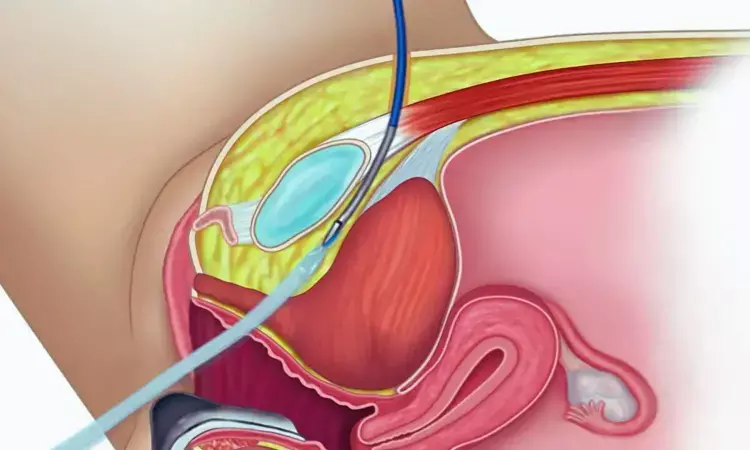- Home
- Medical news & Guidelines
- Anesthesiology
- Cardiology and CTVS
- Critical Care
- Dentistry
- Dermatology
- Diabetes and Endocrinology
- ENT
- Gastroenterology
- Medicine
- Nephrology
- Neurology
- Obstretics-Gynaecology
- Oncology
- Ophthalmology
- Orthopaedics
- Pediatrics-Neonatology
- Psychiatry
- Pulmonology
- Radiology
- Surgery
- Urology
- Laboratory Medicine
- Diet
- Nursing
- Paramedical
- Physiotherapy
- Health news
- Fact Check
- Bone Health Fact Check
- Brain Health Fact Check
- Cancer Related Fact Check
- Child Care Fact Check
- Dental and oral health fact check
- Diabetes and metabolic health fact check
- Diet and Nutrition Fact Check
- Eye and ENT Care Fact Check
- Fitness fact check
- Gut health fact check
- Heart health fact check
- Kidney health fact check
- Medical education fact check
- Men's health fact check
- Respiratory fact check
- Skin and hair care fact check
- Vaccine and Immunization fact check
- Women's health fact check
- AYUSH
- State News
- Andaman and Nicobar Islands
- Andhra Pradesh
- Arunachal Pradesh
- Assam
- Bihar
- Chandigarh
- Chattisgarh
- Dadra and Nagar Haveli
- Daman and Diu
- Delhi
- Goa
- Gujarat
- Haryana
- Himachal Pradesh
- Jammu & Kashmir
- Jharkhand
- Karnataka
- Kerala
- Ladakh
- Lakshadweep
- Madhya Pradesh
- Maharashtra
- Manipur
- Meghalaya
- Mizoram
- Nagaland
- Odisha
- Puducherry
- Punjab
- Rajasthan
- Sikkim
- Tamil Nadu
- Telangana
- Tripura
- Uttar Pradesh
- Uttrakhand
- West Bengal
- Medical Education
- Industry
Mesh slings for stress urinary incontinence: Informed decision-making only way out

UK: A recent study published in European Urology Focus systematically reviewed the short- and long-term complications of mesh slings reported in observational data compared with clinical trial data. The study also determined whether the complication rates from clinical trials reflect "real-world" observational data.
The researchers found that short- and long-term data on polypropylene mesh used for female stress urinary incontinence (SUI) are fairly comparable when using outcome data from well-designed clinical trials or less structured retrospective or prospective registries. However, the research team suggest making comparisons with caution since the two systems of data collection are inherently incomparable.
The complications of synthetic mid-urethral slings (MUSs) in women with SUI have become a globally debated issue. High-quality information is important to know whether mesh tapes used for stress incontinence treatment are safe and work well.
For the review, Fawzy Farag, Sohag University Hospital, Sohag, Egypt, and colleagues searched the online databases. They followed methods as detailed in Preferred Reporting Items for Systematic Reviews and Meta-analyses and Cochrane Handbook for Systematic Reviews of Interventions. Thirty registries/databases including 709 335 MUS procedures were identified.
Key findings were as follows:
- MUS procedures were associated with intraoperative bladder perforation in 0.86-3.6%, urethral perforation in 0-0.1%, vascular injury in 0.04-0.1%, voiding lower urinary tract symptoms (LUTS) in 1.47-3.5%, vaginal exposure in 0.2-1.9%, and reoperation in up to 9% of cases.
- Forty-three randomised clinical trials were identified, including 6284 women who underwent MUS procedures and 2177 women who underwent other interventions (1-10 years of follow-up).
- MUS procedures were associated with urinary tract perforation in 2.58%, vaginal injury in 1.43%, de novo voiding LUTS in 4.37%, de novo storage LUTS in 5.41%, mesh extrusion/exposure (vaginal/urinary tract) in 2.54%, dyspareunia in 2.26%, pain (pelvic/suprapubic/perineal) in 2.83%, and reoperation for complications required in 1.82% of cases.
- Meta-analyses of the randomised controlled trials revealed that retropubic MUSs were associated with more events of urinary tract perforation (risk ratio [RR] 9.81, high certainty of evidence [COE]) and voiding LUTS (RR 1.57, high COE) than transobturator MUSs.
- MUSs were associated with more events of pain than mini-slings (RR 1.72, moderate COE).
"Well-designed clinical studies give similar results to large registration databases," the researchers wrote. "These data should be interpreted with caution given the different ways of the information collection."
"These results will help physicians and patients understand the risks of mesh tapes," they concluded.
Reference:
Farag F, Osman NI, Pang KH, Castro-Diaz D, Chapple CR, Cruz F, Gamé X, Goldman H, Greenwell T, Hampel C, Scailteux LM, Roovers JP, Welk B, Heesakkers J. Complications of Synthetic Midurethral Slings: Is There a Relevant Discrepancy Between Observational Data and Clinical Trials? Eur Urol Focus. 2023 Nov 14:S2405-4569(23)00244-4. doi: 10.1016/j.euf.2023.11.002. Epub ahead of print. PMID: 37973453.
Dr Kamal Kant Kohli-MBBS, DTCD- a chest specialist with more than 30 years of practice and a flair for writing clinical articles, Dr Kamal Kant Kohli joined Medical Dialogues as a Chief Editor of Medical News. Besides writing articles, as an editor, he proofreads and verifies all the medical content published on Medical Dialogues including those coming from journals, studies,medical conferences,guidelines etc. Email: drkohli@medicaldialogues.in. Contact no. 011-43720751


